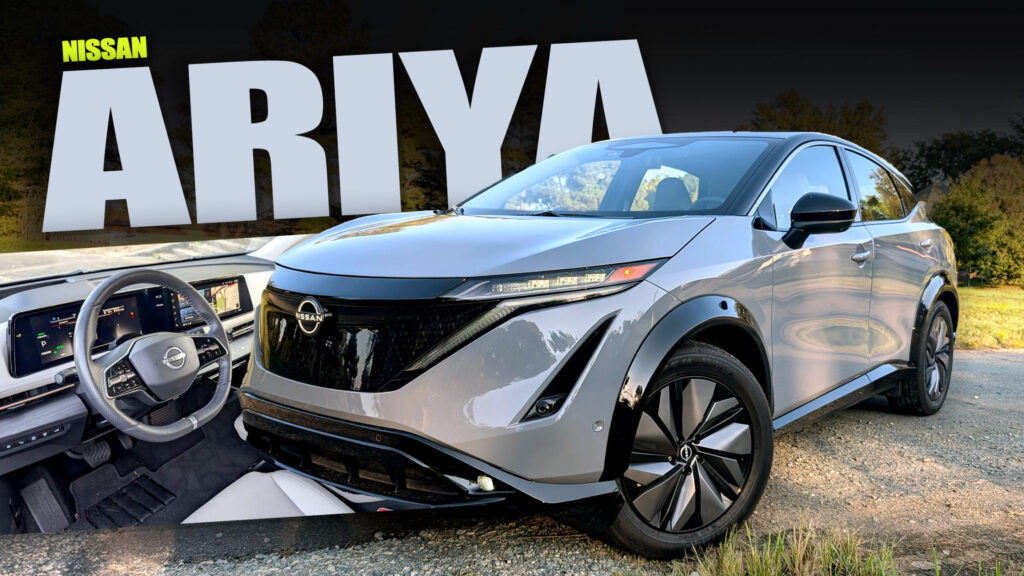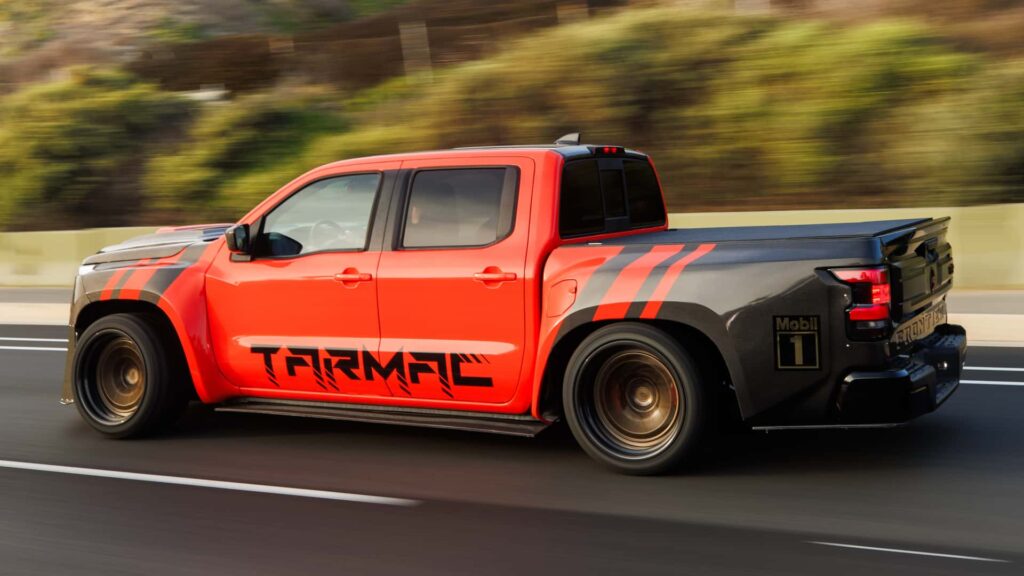PROS ›› Comfortable Zero Gravity seats, spacious and well-designed cabin, quiet ride quality, intuitive infotainment system. CONS ›› Slower charging speeds, no one-pedal driving mode, limited range on base model, less dynamic handling.
Nissan launched the Ariya in 2022 and has since discontinued production of the Leaf, its long-standing EV pioneer. That shift elevates the Ariya from being just another SUV in Nissan’s lineup to a cornerstone of its electrification strategy. As a direct competitor to crossovers like the Tesla Model Y, Hyundai Ioniq 5, and Ford Mustang Mach-E, the Ariya has a critical role to play in maintaining Nissan’s relevance in the EV market.
Review: New VW ID. Buzz Is The Coolest Minivan On The Block, But There’s A Big Caveat
Yet, despite its importance, all those rivals managed to outsell the Ariya by a notable margin in 2023. This might come as a surprise to those who recall Nissan halting orders early on due to overwhelming demand at launch. The big question remains: what exactly is holding the Ariya back from claiming a larger slice of the EV market?
That’s a good question and beyond production factors, we set out to find an answer from the car itself. To that end, we tested it in Little Rock, Arkansas for a full week. It hauled bikes, people, and other cargo all over, went through a full battery worth of miles, and more. It turns out that Nissan has a few significant opportunities to improve this EV but that doesn’t mean that its rivals can’t learn something from the Ariya.
QUICK FACTS
Average range, not so fast charging
Nissan offers the Ariya with two battery options, but only the base trim comes with a 63 kWh pack. It delivers just 216 miles (348 km) of range with front-wheel drive, and even fewer—205 miles (330 km)—with all-wheel drive. That said, our test vehicle is the Empower+ trim, which comes with an 87 kWh battery, front-wheel drive, and 289 miles (465 km) of range. It makes 238 horsepower (117 kW)—not too shabby, but nothing to write home about either.
Read: Sure, You Can Lease The Ariya For $99 A Month, If You’re Cool With Actually Paying $238
Notably, the Ariya tops out at a maximum charging rate of 130 kW, which is significantly slower than what other manufacturers offer, where charging speeds can reach up to 350 kW. Even brands that don’t come anywhere near that figure, like Ford, are still capable of DC fast charging at 150 kW. Faster charging, of course, means less time spent plugged in, allowing for quicker turnarounds during long trips or when time is limited.
Around town over the course of a week, that wasn’t much of an issue, despite my inability to charge at home. Simply driving the car to a nearby coffee shop and plugging it into a public charger across the street worked without any issues. A few hours later, it was fully charged, and I was ready to continue on my way. The best part? The charger was a free public one, so I didn’t have to pay a single cent to juice up and add more miles to my drive.
After the week of driving, I averaged 2.6 miles per kWh. That results in around 226 miles (364 km) of real-world range in a mix of conditions. For the average driver that will be more than enough. If that same person can charge at home, it’ll be even less of a concern. Only those who regularly travel distances exceeding 200 miles (322 km) in a single day will need to be more mindful of the vehicle’s range.
A spacious and comfortable cabin
Photos Stephen Rivers/Carscoops
The Ariya is slightly smaller than cars like the Hyundai Ioniq 5 and the Ford Mustang Mach-E but one wouldn’t know that from slipping into the cabin. In fact, it has more headroom in both rows than the Ford and barely lags behind the Hyundai in that category. In addition, the open layout of the front seats makes the cabin feel more spacious.
Nissan offers a really interesting solution for those who actually prefer a more segregated front seat space. The center console slides forward and back with an electric motor. In addition, a slide-out drawer in the center of the dash also moves with an electric motor and the two can nearly meet to provide a very different center console layout.
About those touch-based controls
It’s not the only party trick in the Ariya, either. The dashboard is almost completely devoid of physical switchgear. All that’s left are the power button and the media on/off switch with an integrated volume knob. Next to that knob are two hidden switches for the hazard lights and track skipping. Beyond that, every single climate control function is seamlessly embedded into the dashboard itself.
I expected to hate this solution and it’s far from perfect, but I think it’s a step in the right direction if real switchgear isn’t on the menu. The issue of having to look down to confirm one’s touch is still there but the buttons do provide haptic feedback when pressed. In addition, while the surface does pick up fingerprints, it doesn’t show them off the way piano black trim does. I’m counting those as wins on top of the fact that people seeing it for the first time will probably like it.
The infotainment system is pleasant to use and logically laid out. I really like the integrated navigation that includes a real-time map of how far the car can go given its state of charge.
Where the Ariya shines brightest though isn’t with its fancy electronics though. It’s the level of comfort it brings to the everyday drive. The seats are well cushioned but supportive too. Nissan leverages its Zero Gravity “fatigue-free” seats in the front of the Ariya and they’re great. Modeled to emulate the feeling one would get in zero-g conditions, they provide excellent support from the pelvis through the chest of occupants.
The rear seats aren’t as advanced, but still accommodate two passengers comfortably and three in a pinch. Nissan incorporates a cross-hatch Kumiko-inspired design throughout the Ariya and in several places, ambient lighting shines through that pattern. It’s a high-end look that elevates the cabin. Think of space as similar to the minimalist style found in a Tesla but with more comfort and common sense controls.
Behind the second row, one will find 22.8 cubic feet of storage which is more than enough for most long weekend trips. Should one need to transport something larger, like a bicycle, the rear seats fold down to reveal 59.7 cubic feet. That space made moving things around very easy in the Ariya.
A (mostly) comfortable ride and decent handling
The Ariya is an interesting crossover to drive. Remember that the big promise here is comfort and it largely delivers on it. The accelerator pedal provides the ability to give it very subtle inputs and receive appropriately subtle feedback. The suspension soaks up most imperfections in the road but we’d love to see even more refinement here. Some cracks or potholes made a larger impact on the cabin than expected.
More: 5 Big Updates For The 2025 Nissan Murano That Matter Most
The brakes feel good underfoot, but using regeneration to brake (Nissan’s E-Step mode) is an odd experience. At first, the car slows rapidly, but since there is no true one-pedal drive mode in the Ariya, you still need to engage the brakes to bring the car to a complete stop.
Then, they’ll find that the pedal actually moved away during the regen-braking phase, so it’s not exactly where their foot remembers it. We’d love to see a true one-pedal driving mode here. For those EV drivers who don’t leverage one-pedal driving, the brakes in the Ariya are just fine.
Handling is another area where the Ariya doesn’t really shine or shudder. It’s easy to direct but perhaps not as sharp as some rival offerings. We expect the Ariya NISMO that’s coming soon to remedy that concern and provide a more engaging driving experience.
Really though, the way this car drives is likely to appeal to many buyers looking for a vehicle in this segment. It feels better to drive than anything else in Nissan’s catalog save for the Z and GT-R, but at the same time, isn’t overly harsh. In a world of cars that push toward one end of the spectrum or the other, the Ariya nestles into a comfortable middle ground.
Verdict
Nissan isn’t leading the EV charge anymore and the Ariya isn’t a class leader either. At the same time, it might be very attractive to buyers who prefer a Japanese-built EV. Toyota, Subaru, Honda, and Mazda are still trying to find their way in the same space. In that group, the Ariya is as good, if not the best, of the bunch.
At the same time, Nissan will do well to update this EV with faster charging ability, sharper stock driving dynamics, and more range. Until then, electric crossovers like the Tesla Model Y, the Ford Mustang Mach-E, and the Hyundai Ioniq 5 will likely continue to dominate in terms of overall market share.
This crossover effectively blends what Nissan buyers are used to, such as the Murano and Rogue, with the benefits of driving an EV. Approaching this car with the mindset that it’s a love letter to Nissan owners helps explain many of its design decisions.
Those in the market for an EV should to at least check out the Ariya. It excels for those who prioritize comfort and relaxation above all else. No, it won’t charge as fast as some competitors and it won’t necessarily go as far between stops, but it’s a serene premium space to spend time and sometimes, that’s the most important factor.


